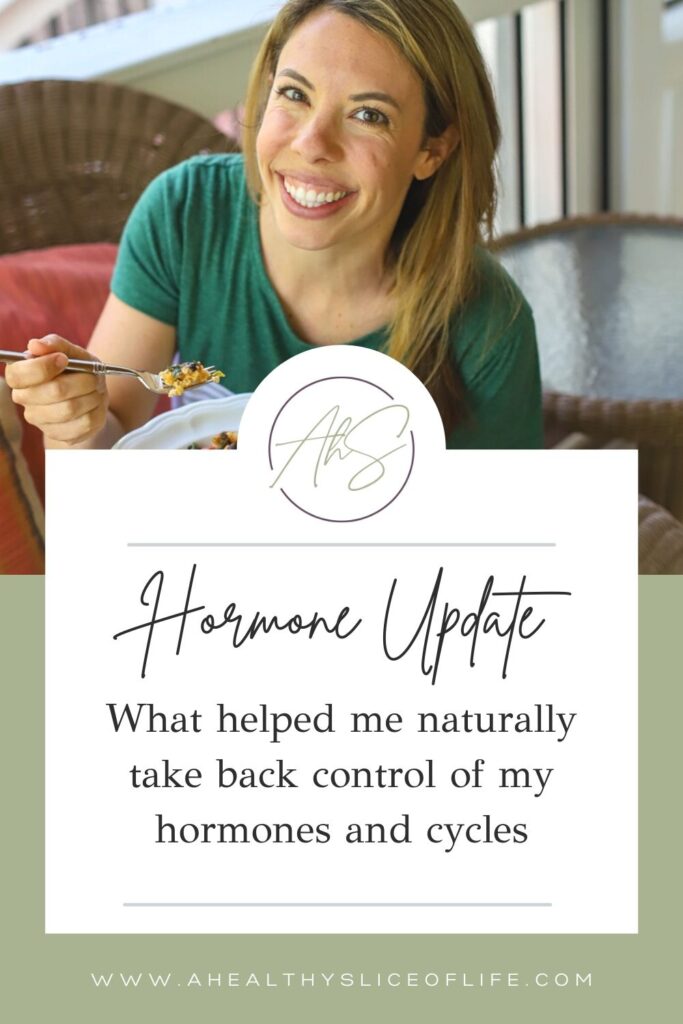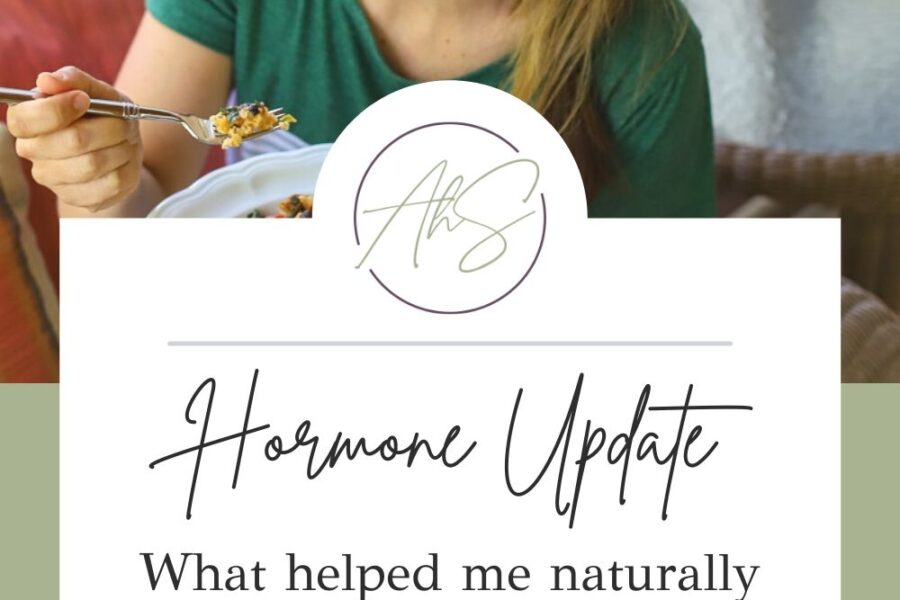If you’ve been here for a while, you may remember me sharing with you about my struggle with hormones, specifically estrogen dominance. My last update was 2 years ago.
In the past two years, I’ve had success through trial and error in discovering what works best in my body. My hormone disturbances are intricately tied to insulin resistance. I feel it’s obvious but important to point out that like with all health matters, there is no one size fits all to balancing hormones. What works for me might wreak havoc on your body. However, I’m happy to share my journey and what is working for me in a hope to provide some jumping off points for you if you’re on a similar (super frustrating) path.

I haven’t provided an update in two years because overall I feel like I’m in a stable place hormonally speaking. There have been some fluctuations over the years, largely occurring during stressful life seasons. Stress absolutely manifests itself it physical ways! Besides those times though, I have been successful in keeping my hormones happy. My proof is largely in my cycle.
For my entire life I had a long and irregular cycle. I was on birth control pills for 10 years, but have not been on them since I was 26 years old. When I went off birth control it took me a full year to get my cycle back. When it did, it was consistently 45-60 days long. My doctor was shocked that I was able to get pregnant.
When I was pregnant, I had that terrible glucose testing experience and they decided I wouldn’t need to be tested again. They would just prick my finger at my office visits. This was a big clue, but not the only one, that highlighted a lot of my imbalances stemmed from blood sugar regulation/insulin resistance issues.
Two years ago I found Robinhood Health in Winston Salem and dug into the issue more. I began taking supplements; you can see them all and get all the details in this post.
But, jumping back to present day, I’m in a good place. To me, that looks like a more regular cycle, usually around 30 days. I track with the app My Flo which allows me to keep track of my cycles and enter symptoms. Have you heard of planning your work around your cycle? This concept used to make no sense to me because I always felt the same all month long, but now I very much feel the ebbs and flows of creative and reflective energy and am fascinated by how to make the most of each phase.
It may not sound like much, but for someone that has never had regular cycles, this kind of change is so empowering. I feel like I’ve been able to make a sincere difference in my health through natural methods. Since that round of supplements two years ago, I haven’t been on any hormone-specific supplements (I do take Vitamin D, Vitamin C, Zinc, and a probiotic).
Here is what has allowed me to keep my hormones naturally stay on track:
Gut Health. I had a yeast overgrowth in my gut. I eliminated foods based on my sensitivity testing and took Amazon A-F to help, but the real difference came when I did a gut cleanse with Courtney. It’s a regimen with three supplements, a biocidin, a binder, and a probiotic. She shares SO much good gut health info and explains why just a probiotic in a damaged gut can’t help without getting the “scum” off the pond first.
Anyway, I did the gut cleanse and I’ll be honest, while I was on it, I did not feel any differently. However, the month after I finished, my cycles shortened and became more regular. Is this a coincidence and just line up as a result because of the other things I was doing? Maybe! But it was too perfect of timing for me not to consider that it had some positive effect on my gut health.
Exercising. I have not lost any weight in the past two years; in fact I’m probably up a pound or two. But the composition of my body has changed in that I have a lot more muscle. I’ve been consistent with Madeline’s workouts for… 2 years? now. Since my hormonal issues are largely tied to blood sugar, having more muscle and less adipose fat helps. Exercising regularly also helps control blood sugars.
Prioritizing Sleep. Lack of quality sleep negatively affects insulin, and the hours before midnight count most (I swear by this). If I don’t sleep well, I’m hungrier and want carbs more the next day, so I shoot for at least 7 hours every night.
Being Mindful of Detoxing. I believe the body is largely capable of detoxing itself, but sometimes it needs a little help. For example: unless it’s the middle of summer, I do not sweat. So I use my Sauna Blanket (AHS for $75 off) to help detox my body through sweating and infrared.
I also am mindful of getting plenty of fiber and staying regular on the bathroom front. Also, drinking plenty of water. I’ve recently added in LMNT electrolytes to help with more balanced hydration. All these things help my body to keep things moving through my system as they should.
Adequate protein. After not eating meat for over a year, it was honestly really hard for me to incorporate it back into my diet, but at the insistence of my hormone expert friend, I did. And it made a huge difference in not only stabilizing my blood sugars, but also helping me to feel more satiated and being able to finally build more lean muscle mass, which in turn, also helps my blood sugars better regulate. I shoot for roughly .85 g/ lb of bodyweight, which is higher than the RDA, but feels like the right ration for me based on results. My go-to sources for protein.
Carb Control. This is the most frustrating part of it all to me, but the most impactful. Everybody has a different carbohydrate tolerance. Some people can eat a ton of quality carbs like grains and beans and do just fine. I happen to have a very low carb tolerance, even when they are quality, healthy carbohydrate sources. How do I know this?
I eat everything right now, no restrictions, but I still loosely monitor my carb intake because when I don’t, I don’t ovulate and my cycles extend and I end up on the 40+ day cycle and feel completely thrown off by it all. Fat and protein are my friends and I feel best when I eat a lot of them and stick to leafy green and cruciferous vegetables (it’s like my natural DIM supplement, though I know you’d have to eat a ton of broccoli for it to actually equate) for the carbs. I can tolerate a meal with bread and a Saturday with chips and dips pretty well (thank goodness), but if it stretches into several days of consistent higher carbohydrates, my blood sugar goes crazy, I feel less energetic and I don’t ovulate.
Sounds intense, right? Was I prediabetic? Maybe. My fasting glucose when last checked in April was 94. “Normal” but on the very high side of clinical normal and not normal if you listen to advice from more holistic doctors. One day I will try a glucose monitoring device. Updated to add- I did try one! My experience with a CGM.
Dietary Factors that Help My Hormones:
- Animal protein sources. I was a vegetarian for over a year, loved the food, and did not miss meat. That’s also when my hormones went crazy and I had all the mid-cycle bleeding issues and my doctor wanted to put my on metformin. I talked with Ali and my Robinhood doctor and they both gently but firmly told me that I had to re-introduce red meat.
- Limited alcohol. I know alcohol is no good for sleep or hormones. My doctor said if I’m going to drink it (and I am), that it’s best for me to stay away from beer and wine because of my tendency for yeast overgrowth in my gut and to stick to hard liquors that don’t raise blood sugars as much. Partially why I’m a martini girl.
- Intermittent fasting. I know this can be terrible for some women and their hormones, and it differs based on where I am in my cycle, but since my issues are tied to insulin resistance, overnight fasts make a big difference for me and increasing insulin sensitivity. I aim for a 14 hour fast, usually 7:00 PM to 9:00 AM.
- Metabolic flexibility. Such a buzz word right now, right? It’s defined as training your body to be able to switch effortlessly between burning carbs for fuel and burning fat for fuel. I’m working on increasing my metabolic flexibility right now. I’m using Lumen* to help me do that. By training my body to better switch between fuel sources, I can eat the higher carb meals without it having as much of an effect on my overall blood sugar health.
I hope this has been helpful to read, but in no way should it be a roadmap to follow. I know hormones are a hot topic right now and I believe that’s because they are such an individualized issues that we can’t go online and find a solution that works for all of us. It took me a lot of time to nail down what works and doesn’t for my body.
I do hope that this posts offers you encouragement if you are on your own hormone journey though. Many traditional doctors can make us feel crazy for sharing our very real symptoms. My own OBGYN doctor, who I absolutely love, was shocked, for example, that I could make much difference in my condition through diet. He assured me that some people are just more genetically prone to things like higher blood sugar and a tiny bit of metformin could fix it. I’m glad I talked with him and he agreed to monitor me while I tried this “natural thing” out.
Wow, this was a super long and wordy post, but if you have any questions I can answer, please leave a comment. I know how frustrating and consuming hormone issues can be and am happy to chat about my experience if it helps you even in a small way.



Gina says
Love reading your updates! I too, want to try out a CGM but also half fear all the data and going crazy with it. So glad you’re doing better and the “natural” path worked out for you. My type A/impatient personality struggles with the time it takes for all this stuff but learning to embrace it as well 🙂
Brittany Dixon says
I’ve basically just made myself understand that mentally there is no finish line; it’s an ever evolving journey. That’s helped me to feel more chill with the slowwww process. I worry about data overload with the CGM device too but it sounds SO cool.
SusieHmMkr says
Good information to help others. Do what you can now to get ahold of it, get in good habits, because things may change in peri-menopause and again in menopause, when hormones do drastic changes. That was my experience with insulin resistance (and PCOS). And it’s not been fun!